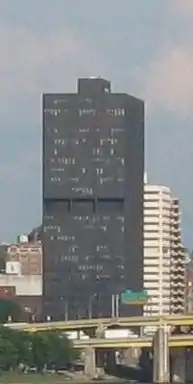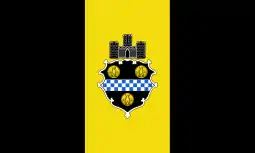11 Stanwix Street
11 Stanwix Street, formerly known as the Westinghouse Tower, is one of the major distinctive and recognizable features of Downtown Pittsburgh, Pennsylvania in the United States.
| 11 Stanwix Street | |
|---|---|
 View of 11 Stanwix Street building from the West End Bridge | |
| General information | |
| Status | Completed |
| Type | Office |
| Location | 11 Stanwix Street, Pittsburgh, Pennsylvania |
| Completed | November 24, 1969[1] |
| Cost | $20 million ($159.6 million today)[2] |
| Height | |
| Roof | 355 ft (108 m) |
| Technical details | |
| Floor count | 23 |
| Floor area | 738,000 sq ft (68,600 m2) [3] |
| Design and construction | |
| Architect(s) | Harrison & Abramovitz |
| Other information | |
| Parking | 500 |
Westinghouse Electric Corporation Headquarters | |
| Part of | Pittsburgh Renaissance Historic District[4] (ID13000252) |
| Added to NRHP | May 2, 2013 |
History and architectural features
11 Stanwix Street was completed on November 24, 1969,[1] with twenty-three floors. It was originally built and named for the Westinghouse Corporation; in 1999, that company went through a restructuring and moved its headquarters to its longtime research park in the suburb of Monroeville, before expansions in their operations necessitated a move to a larger suburban complex in Cranberry Township.
This tower rises 355 feet (108 meters) above Downtown Pittsburgh and is located near the Monongahela River. A ten-story building that once served as the city's main post was previously located on this site.
During this building's early years, one of the tenants was Federal Home Loan Bank (FHLB) of Pittsburgh, which occupied the third and fourth floors. FHLB later moved to the National Steel Building on Stanwix Street, finally making its permanent home in the Porter Building on Grant Street, now renamed for FHLB. As of June 2009, the building tenants were IBM, the Allegheny Conference on Community Development, the advertising firm Brunner, and the local headquarters of KeyCorp.
Gallery
 View from Point State Park showing First Niagara signage
View from Point State Park showing First Niagara signage
References
- "The Example of Gateway Centre", Pittsburgh Post-Gazette, 25 November 1969
- Jack Sholl (AP), "Pittsburgh Marks Gateway Center's Redevelopment", Observer-Reporter, 25 November 1969
- Dave McConnell, "Equitable May Invest Still More in City", Pittsburgh Post-Gazette, 25 November 1969
- "National Register of Historic Places Registration Form: Pittsburgh Renaissance Historic District" (PDF). National Park Service. May 2, 2013. Retrieved April 22, 2021.
External links
- Toker, Franklin (2007). Buildings of Pittsburgh. Pittsburgh: Chicago: Society of Architectural Historians; Santa Fe: Center for American Places ; Charlottesville: In association with the University of Virginia Press. ISBN 0-8139-2650-5.
